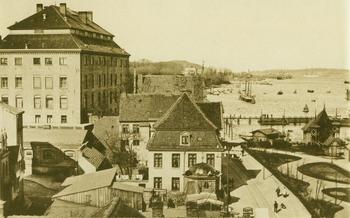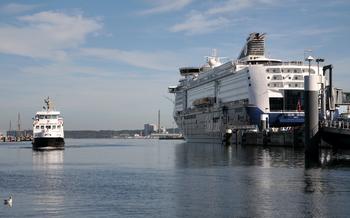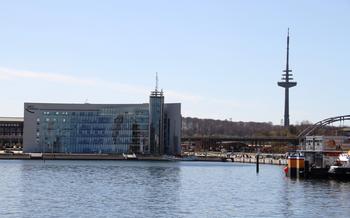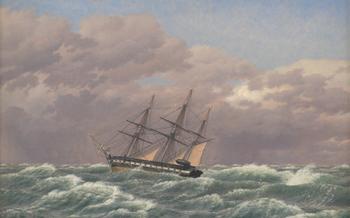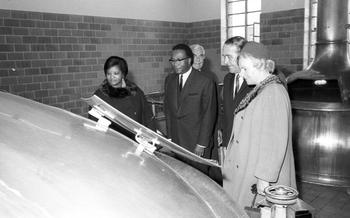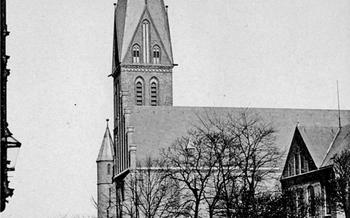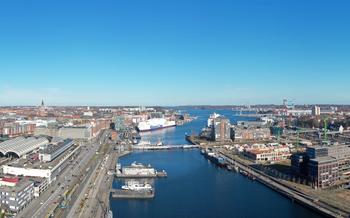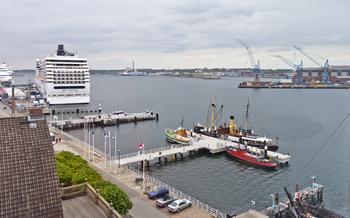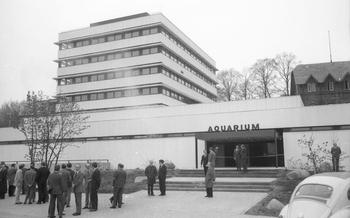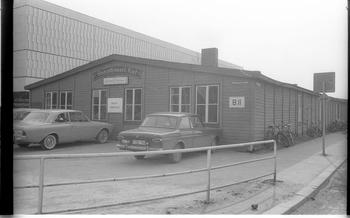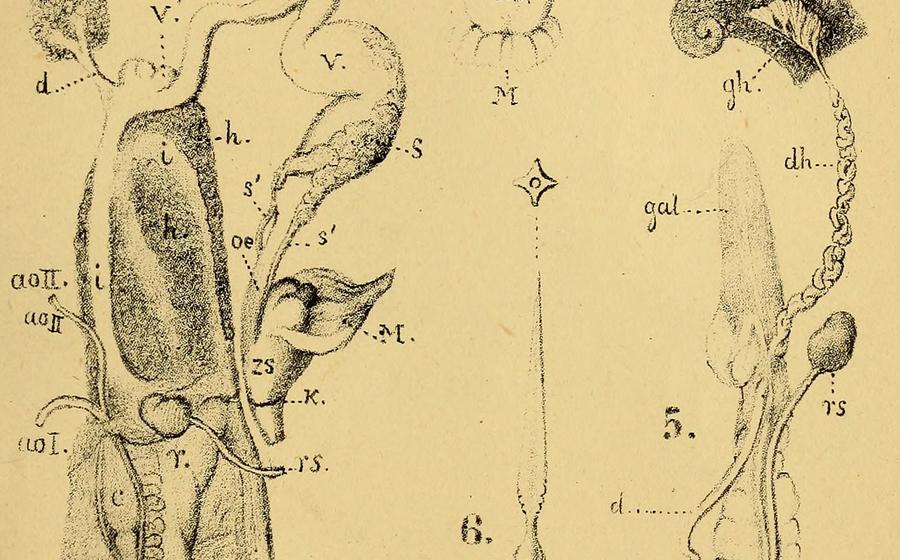
Zoological Museum at Kiel University
- Historical Background
- Exhibits and Collections
- Research and Conservation
- Educational Programs
- Architecture and Design
- Accessibility
- Family-Friendly Activities
- Special Events and Exhibitions
- Museum Shop and Cafe
- Location and Transportation
- Sustainability and Environmental Practices
- Community Involvement
- Volunteer Opportunities
- Insider Tip: Unveiling the Hidden Treasure of the Zoological Museum
Historical Background
The Zoological Museum at Kiel University, established in 1881, holds a significant place in the history of Kiel and zoological research in Germany. Founded by renowned zoologist Karl August Möbius, the museum's creation stemmed from his vision to establish a comprehensive zoological collection for educational and scientific purposes. Over the years, the museum has evolved into a leading institution, contributing to the advancement of zoological knowledge and the preservation of Kiel's rich natural heritage.
Notable contributions to zoological research have been made by scientists associated with the museum. These include studies on marine invertebrates, deep-sea organisms, and the evolution of animal species. The museum's collection of type specimens, representing the original reference specimens for newly described species, holds immense scientific value and attracts researchers from around the world. The museum's dedication to preserving and showcasing Kiel's natural heritage is evident in its extensive collection of local fauna, providing valuable insights into the region's biodiversity.
Exhibits and Collections
The Zoological Museum at Kiel University boasts a diverse and captivating array of exhibits and collections that showcase the wonders of the animal kingdom. From the tiniest insects to the largest marine creatures, the museum offers a comprehensive exploration of animal life.
Visitors can marvel at the museum's extensive collection of insects, which represents a significant portion of the global insect diversity. With over 10 million specimens, the insect collection is a treasure trove for entomologists and nature enthusiasts alike.
The museum's marine life collection is equally impressive, featuring a variety of fish, mollusks, crustaceans, and other marine organisms from around the world. Visitors can learn about the intricate adaptations that allow these creatures to thrive in the ocean's depths, and gain insights into the delicate balance of marine ecosystems.
Among the highlights of the museum's collection are the type specimens, which are the original specimens used to describe and name new species. These specimens hold immense scientific value, as they serve as the reference point for identifying and classifying species.
One of the most remarkable exhibits at the museum is the giant squid, which measures over 10 meters in length. This awe-inspiring creature is a testament to the vastness and mystery of the deep sea.
With its diverse exhibits and collections, the Zoological Museum at Kiel University offers a fascinating journey into the world of animal life, providing visitors with a deeper understanding of the natural world and the importance of biodiversity.
Research and Conservation
The Zoological Museum at Kiel University is not just a repository of specimens; it is also a hub of ongoing research and conservation activities. The museum's researchers are actively engaged in a wide range of projects, from studying the behavior of marine mammals to exploring the evolutionary relationships among different species. They collaborate with scientists from around the world, contributing to the advancement of zoological knowledge.
The museum plays a vital role in conservation efforts. Its collections provide valuable data for monitoring and assessing the status of species, and the museum's staff is involved in numerous conservation projects. For example, the museum is part of a collaborative effort to protect the critically endangered North Atlantic right whale. Researchers at the museum are studying the whale's migration patterns, feeding habits, and reproductive behavior to inform conservation strategies.
The Zoological Museum's commitment to conservation extends beyond research. The museum also works to educate the public about the importance of biodiversity and the threats facing wildlife. Through exhibits, educational programs, and outreach events, the museum helps to raise awareness and inspire action to protect our planet's incredible diversity of life.
Educational Programs
The Zoological Museum is not just a repository for specimens and research; it's also a vibrant hub for education and scientific outreach. The museum offers a wide range of educational programs tailored to students of all ages, from curious kindergarteners to inquisitive university students. Interactive exhibits and hands-on activities bring the wonders of the animal kingdom to life, fostering a love for nature and inspiring the next generation of scientists.
One of the museum's most popular programs is the "Zoological Explorers" club, where young nature enthusiasts can embark on exciting adventures every month. They learn about animal behavior, habitats, and conservation while engaging in fun activities like animal tracking, fossil hunting, and bug hunts. These programs not only teach children about the natural world but also instill in them a sense of responsibility towards protecting it.
For older students, the museum offers guided tours, workshops, and lectures that delve deeper into specific zoological topics. These programs are designed to complement classroom learning and provide students with a unique opportunity to interact with experts in the field. University students can even get involved in research projects, working alongside scientists to contribute to the advancement of zoological knowledge.
The Zoological Museum's educational programs are not just informative but also transformative. They empower visitors to become informed advocates for the natural world, capable of making informed decisions about conservation and sustainability. Whether it's a child's wide-eyed wonder at their first encounter with a live spider or a university student's groundbreaking discovery in the lab, the museum's educational programs leave a lasting impact on all who participate.
Architecture and Design
The Zoological Museum at Kiel University stands as a testament to the architectural prowess of the early 20th century. Its imposing facade, adorned with intricate carvings and sculptures, hints at the treasures that lie within. Constructed in a neo-Gothic style, the museum's exterior blends seamlessly with the surrounding university buildings, creating a harmonious ensemble.
Inside, visitors are greeted by a grand entrance hall, featuring a sweeping staircase and stained glass windows that bathe the space in a kaleidoscope of colors. The museum's galleries are arranged around a central atrium, allowing for a seamless flow of visitors and creating a sense of interconnectedness between the various exhibits.
One of the most striking features of the museum's architecture is its use of natural light. Large windows and skylights illuminate the galleries, showcasing the exhibits in their best light. This interplay of light and shadow creates a dramatic effect, enhancing the visitor's experience and bringing the natural world to life.
In recent years, the museum has undergone extensive renovations to modernize its facilities and improve accessibility. These renovations have been carried out with great care and attention to detail, ensuring that the museum's historical integrity remains intact. As a result, visitors can now enjoy a seamless blend of old-world charm and modern amenities.
Whether you are an architecture enthusiast, a lover of nature, or simply someone who appreciates beauty, the Zoological Museum at Kiel University is a must-visit destination. Its stunning architecture, coupled with its world-class exhibits, makes for an unforgettable experience.
Accessibility
The Zoological Museum is committed to ensuring that all visitors, regardless of their abilities, can enjoy and benefit from its exhibits and educational programs. The museum features a number of accessibility features to accommodate visitors with disabilities, including wheelchair ramps, elevators, and accessible restrooms. Additionally, the museum offers audio guides and other assistive devices to enhance the experience for visitors who are visually or hearing impaired. The museum staff is also trained to assist visitors with disabilities and ensure that they have a positive and inclusive experience. The museum's commitment to accessibility extends beyond physical barriers, as it also offers programs and resources tailored to the needs of visitors with cognitive or learning disabilities. By providing a welcoming and accessible environment, the Zoological Museum strives to create a space where everyone can learn about and appreciate the wonders of the natural world.
Family-Friendly Activities
The Zoological Museum is a treasure trove of discovery and wonder for families with children. The museum's interactive exhibits and hands-on activities are designed to engage young minds and foster a love for nature. Kids can explore the wonders of the animal kingdom through interactive displays, touch tanks, and life-size models. The museum also offers a variety of educational programs and workshops tailored specifically for children, where they can learn about animal behavior, ecology, and conservation.
One of the highlights for families is the "Animal Encounters" program, which allows children to get up close and personal with live animals, such as snakes, lizards, and insects, under the supervision of experienced educators. The museum also hosts regular family events and workshops, such as "Fossil Fun Day" and "Creatures of the Night," where kids can participate in hands-on activities, crafts, and storytelling sessions.
For a truly memorable experience, families can book a guided tour led by a knowledgeable educator who can tailor the tour to the interests and age level of the children. Guided tours offer a more in-depth exploration of the museum's exhibits and collections, allowing families to learn more about the fascinating world of animals.
To make the most of a visit with children, it's a good idea to plan ahead and allow plenty of time to explore the museum's many exhibits. The museum also has a designated family area where children can take a break, play games, and enjoy a snack. With its engaging exhibits, educational programs, and family-friendly atmosphere, the Zoological Museum promises a fun and enriching experience for visitors of all ages.
Special Events and Exhibitions
The Zoological Museum at Kiel University hosts a variety of special events, temporary exhibitions, and seasonal activities throughout the year, offering visitors a chance to experience the museum in new and exciting ways. These events and exhibitions often focus on specific themes or topics related to zoology and natural history, providing visitors with an opportunity to delve deeper into the fascinating world of animals.
Upcoming events at the museum include a lecture series on the latest findings in marine biology, a hands-on workshop on animal tracking and conservation, and a special exhibition on the evolution of birds. Visitors can also look forward to seasonal events such as the annual "Night at the Museum" event, where the museum stays open late with special activities and guided tours.
Past events at the museum have included a popular exhibition on the life and work of Charles Darwin, a family-friendly event featuring live animal encounters, and a film festival showcasing documentaries on wildlife and conservation. These events have been a great success with visitors, attracting large crowds and generating positive feedback.
To make the most of your visit, be sure to check the museum's website or social media pages for information on upcoming events and exhibitions. Planning your visit around a specific event or exhibition can enhance your experience and provide you with a unique opportunity to learn more about the world of animals.
Museum Shop and Cafe
The Zoological Museum offers a well-stocked museum shop where visitors can purchase a variety of souvenirs, educational materials, and books related to zoology and natural history. From plush toys and animal figurines to field guides and scientific publications, the shop has something for everyone.
After exploring the exhibits, visitors can relax and refuel at the museum's charming cafe. The cafe offers a selection of snacks, beverages, and light meals, including sandwiches, salads, and pastries. Enjoy a cup of coffee or tea while admiring the museum's beautiful surroundings or simply taking a break from your exploration.
One of the highlights of the cafe is its outdoor seating area, which provides a tranquil oasis amidst the bustling city. Visitors can sit back, sip on their drinks, and soak in the peaceful atmosphere of the museum's courtyard. The cafe is a popular spot for families to have a picnic lunch or for students to gather and study.
Location and Transportation
The Zoological Museum is conveniently located in the heart of Kiel, within easy reach of other attractions, shopping areas, and public transportation hubs. Its address is Hegewischstraße 3, 24105 Kiel, Germany.
To get to the museum by public transportation, visitors can take bus lines 11, 21, 22, 31, 32, 33, 34, 39, 40, or 41 to the "Zoologisches Museum" bus stop, which is right outside the museum's entrance. Alternatively, visitors can take the Kiel Hauptbahnhof (main train station) to the "Zoologisches Institut" stop and walk a short distance to the museum.
For those arriving by car, the museum offers ample parking spaces in its designated parking lot, which is located adjacent to the building. The parking lot is accessible from Hegewischstraße and is free of charge for museum visitors.
Once at the museum, visitors will find it easy to navigate, as it is a relatively small and compact building. The exhibits are arranged in a logical order, and there are clear signs and directions throughout the museum to help visitors find their way around.
Sustainability and Environmental Practices
The Zoological Museum at Kiel University is committed to operating sustainably and reducing its environmental impact. The museum actively implements green initiatives and practices to preserve the environment and promote conservation. Visitors will notice the museum's efforts in energy efficiency, waste reduction, and recycling programs. These initiatives demonstrate the museum's commitment to protecting the planet and promoting responsible practices among its visitors. By adopting sustainable practices, the Zoological Museum sets an example for other institutions and encourages visitors to embrace environmental responsibility in their own lives.
Community Involvement
The Zoological Museum at Kiel University actively participates in the local community, fostering a sense of belonging and promoting a shared appreciation for the natural world. Its outreach programs are designed to engage people of all ages and backgrounds, fostering scientific curiosity and a deeper understanding of the environment. The museum collaborates with schools, community groups, and organizations to provide educational workshops, lectures, and special events. These initiatives aim to inspire the next generation of scientists, conservationists, and environmentally conscious citizens.
One notable outreach program is the "Zoological Museum on Tour," where museum staff and volunteers visit local schools and community centers to bring the wonders of the natural world to students and residents who may not have the opportunity to visit the museum. Through interactive presentations, hands-on activities, and engaging storytelling, the museum team shares fascinating facts about animals, ecosystems, and the importance of biodiversity.
The museum also hosts regular events that encourage community participation, such as "Science Saturdays" and "Family Fun Days." These events feature themed exhibitions, interactive workshops, guided tours, and live animal encounters that bring the museum's collections and research to life. By actively engaging with the community, the Zoological Museum at Kiel University strengthens its bond with the city and region, fostering a sense of shared stewardship for the natural world.
Volunteer Opportunities
The Zoological Museum at Kiel University offers a rewarding opportunity for individuals passionate about zoology and natural history to contribute to the museum's mission and make a difference. The museum's volunteer program welcomes individuals from all backgrounds and experience levels, providing a variety of roles to suit different interests and skills.
Volunteers at the Zoological Museum play a crucial role in supporting the museum's educational and research initiatives. They assist with tasks such as leading tours for school groups, assisting with research projects, and helping to maintain and care for the museum's collections. Docents share their knowledge and enthusiasm for zoology with visitors, while educators develop and deliver educational programs for students of all ages. Research assistants support scientists in their research activities, contributing to the advancement of zoological knowledge.
Volunteering at the Zoological Museum is a fulfilling experience that allows individuals to give back to the community, learn new skills, and make meaningful connections with like-minded people. Volunteers have the opportunity to work alongside experts in the field of zoology, gain hands-on experience with museum specimens, and contribute to the preservation and understanding of our natural world.
If you are interested in becoming a volunteer at the Zoological Museum, please contact the museum's volunteer coordinator for more information and to discuss available opportunities. The museum welcomes volunteers of all ages and backgrounds, and provides training and support to ensure a rewarding and enriching experience for all.
Insider Tip: Unveiling the Hidden Treasure of the Zoological Museum
When exploring the Zoological Museum, take a moment to seek out a hidden treasure that often goes unnoticed by visitors. In the depths of the museum, nestled among the many exhibits, lies a remarkable collection of beautifully preserved sea creatures. These specimens, collected from various corners of the world's oceans, showcase the incredible diversity and wonders of marine life. From delicate jellyfish to intricate seashells, this collection offers a glimpse into the fascinating world beneath the waves. Don't miss this hidden gem on your journey through the Zoological Museum; it's sure to leave you in awe of nature's artistry.
